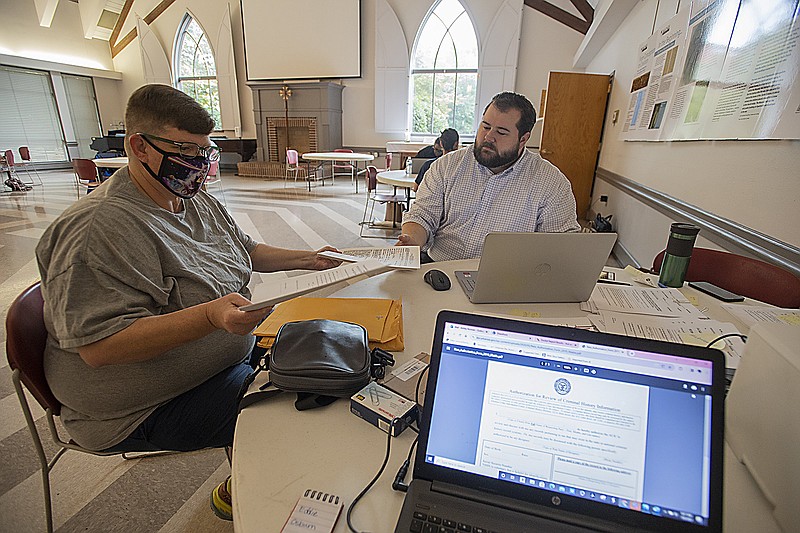FAYETTEVILLE -- The Arkansas Justice Reform Coalition and Legal Aid of Arkansas are hosting a record-sealing clinic today for those who have fulfilled their court obligations and are eligible to have criminal records sealed.
Sarah Moore, executive director at the coalition, said this will be the second in what she hopes will be a continuing series of events meant to help those eligible to have their court records sealed.
The clinic will be 9 a.m. to 2 p.m. today at St. Paul's Episcopal Church, 224 N. East Ave. in Fayetteville. The clinic's services are free.
Charges for Washington County and the cities within Washington County will be addressed, including Johnson, West Fork, Fayetteville, Springdale, Tontitown, Elm Springs, Elkins, Farmington, Prairie Grove and Lincoln.
The group hosted a similar clinic in July, and more than 50 people attended. The clinic helped about 37 people seal their records while the remainder didn't yet qualify, Moore said.
"Those folks may have had some other outstanding charges or some outstanding obligations from their cases that they hadn't yet completed," Moore said of those who didn't qualify.
Ashley Norman, pro bono director with Legal Aid of Arkansas, said in July the clinics help people navigate the process and complete the paperwork. Having attorneys and legal advisers at the clinic helps smooth the process. Norman said her group has held similar clinics in many counties across Arkansas.
Having a criminal record can hinder people in applying for work, seeking housing, applying for credit and other areas, Norman said.
Matt Durrett, Washington County prosecutor, said the July event was "pretty successful." He said he supports allowing people to get their court records sealed.
Durrett said his office checks to make sure each individual is eligible to have his or her record sealed, has completed probation, has paid all court-ordered obligations and has no pending felony charges. Assuming the petitioner is eligible, Durrett said, his office sends a letter to the judge saying they have no objection to the petition to seal the records.
Moore said she hopes to see the clinic become a recurring event in the area. She said the group is already considering ways to host clinics in other locations to make it easier for people to attend.
"We understand there are transportation and mobility limitations, so we're looking at other locations," Moore said. "As long as the community keeps giving us feedback that this is something they want to see happen, it's something we'll keep trying to do."
Registration is preferred but walk-ins will also be handled as time allows. Register online at https://tinyurl.com/washcorecordsealing or by phone at (870) 972-9224, extension 4324.
Criminal Records Sealing Act
Under Arkansas law, person who is eligible to have a record sealed may file a uniform petition in the circuit court or district court in the county where the offense was committed and in which the person was convicted for the offense he or she is now petitioning to have sealed. If the petition is approved, the circuit court clerk and, if applicable, the district court clerk shall remove all petitions, orders, docket sheets, receipts, and documents relating to the record; place the records and sequester the records in a separate and confidential holding area within the clerks office. The Prosecuting Attorneys office and the arresting agency will follow the same procedure for their records. All circuit clerks, district clerks, arresting agencies, and other criminal justice agencies maintaining records in a computer-generated database shall either segregate the entire record, including receipts, into a separate file or ensure by other electronic means that the sealed record shall not be available for general access unless otherwise authorized by law.
Source: Arkansas law

